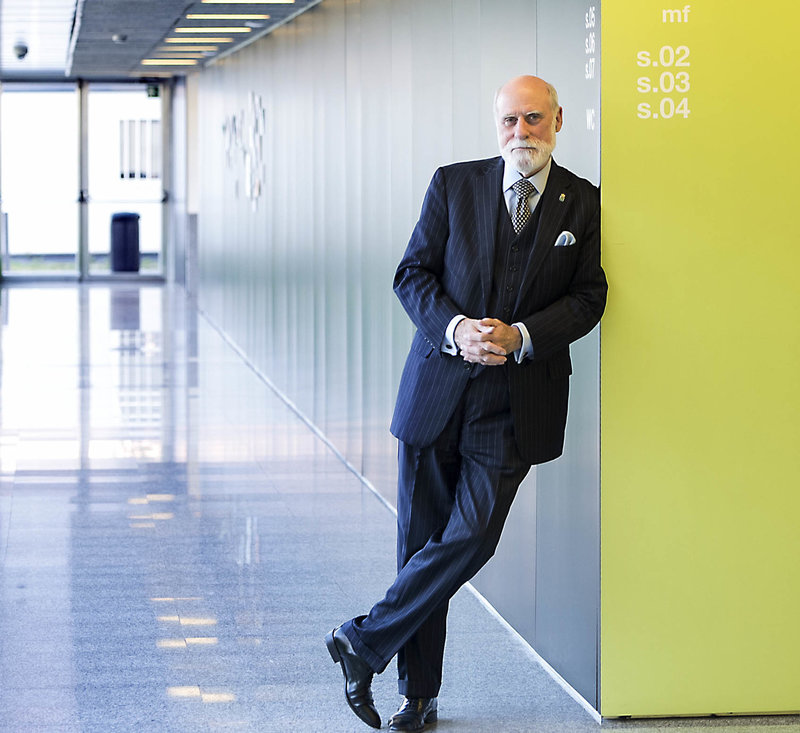Interview
'The internet grows100% every year'
The inventor of network protocols was in Barcelona to receive an honorary degree from the Ramon Llull university
Did you ever imagine that the Internet would have its current global reach?
We could not have known how it would evolve. And even less imagine that it would become a worldwide phenomenon. At that time, at the beginning of the 1970s, we were programmers. We were looking for a global transmission system for diverse types of data to computers all over the world. It was a commission from the US Defense Department. The network was later commercialised, with investment was put into development, into equipment... firms saw a business opportunity.
How long did it take?
From 1973 to 1983 we did testing. We were not given permission until 1989; they did not take us seriously. In San Diego there is a lot of surfing and as it was about surfing the network, we wanted to call the company 'Surf'. There was a research laboratory using that acronym and so we changed it to my surname: 'Cerf Company'. But in reality we wanted to be called, California Educational Reserch Foundation, resembling my surname.
Was that when the boom came along?
In 1991, www domain names were created, but no one paid any attention. Two young men in the national supercomputing centre designed the browser and also created a webpage with text and photographs. They were crazy, they said. Then we created a mosaic to input all the information we might want, with Marc Andreessen, the co-founder of Netscape. In 1995, it was released to the public and everyone went crazy when they saw the placeholders for the information. That is how webpages are made now. We went to Silicon Valley to create email... At the turn of the century, investment began to pour in.
Where are we now?
The internet is still growing 100% every year. But it depends on where you live. In China they are slowing it down. India is quickly waking up to it... The rest of the world is becoming connected through seven billion mobile phones. In the West, access is almost universal. But that's not the case in poor countries. Internet will become an indicator of the level of welfare.
When will everyone have access to it?
In 2020, between 80% and 90% of the world population will have access to the Internet, whether it be by satellite or through batteries.
What will they do with it?
Whatever takes their fancy. It might be cars that park themselves, applications for health, sensors that help you out…
And censorship?
It's the worst part of it. There are states like China that want to control information, and the spirit of the net is precisely that information circulates without any barriers. Where the internet is concerned there is a bit of everything: certainties and big mistakes. Credibility is a problem, I have to admit. But the net is a medium, it does not distinguish between truth and lies.
Is this distinction a challenge the internet is facing?
And deciphering whether information or data is correct or false. But this task does not depend on the creators of the net or the providers of browsing services, but rather it is the common responsibility of the whole of society. Of all of us who are using it now. We show children how to behave correctly and we show them what is good and what isn't, and to distinguish between information and risk. Well, we also need to apply this educational spirit.
Truth used to be found in books, where is it now?
There are also badly written books and bad information that can be well presented! Albert Einstein was also thought to be wrong for years... and then he opened our eyes to the world of science. There is much more knowledge than we are capable of knowing. The Universe is there to be discovered and it is not standing still. It lives through transformation. Information is also alive.
Has the Internet of Things arrived? Are we ready for it?
Absolutely not, because we are genetically prepared for other activities. But we'll assimilate it because it helps us to do those activities.
Will technology end up getting the best of us?
It's another challenge for the internet. We need to prepare devices or objects so that technology does not come to dominate human knowledge.
It already does. Google knows everything about us.
But it is not only internet companies that have information about us, it is also those that provide electricity, gas, water... And do they use this information for bad? The internet is not the only danger. I admit that we need to improve privacy, security and trustworthiness.
Shouldn't networks for distributing technology be public, like water or electricity?
Being public does not guarantee they work better. Perhaps we need more guarantees of access and more social rates. Yet, these services are not so democratic, as they tend to be monopolies.
THEORY AND PRACTICE
Every time we connect to the internet we should spare a thought for Cerf. This US engineer and technologist invented the basic network architecture, email and the way to create websites, all due to a search to find a way of interconnecting computers. He was in Barcelona to receive an honorary degree from the Universitat Ramon Llull at the bidding of the Escola Tècnica Superior d'Enginyeria Electrònica i Informàtica La Salle, as part of the main events in the 50th anniversary celebrations of the Escola de Telecomunicacions.
Leave a comment
Sign in.
Sign in if you are already a verified reader.
I want to become verified reader.
To leave comments on the website you must be a verified reader.
Note: To leave comments on the website you must be a verified reader and accept the conditions of use.

